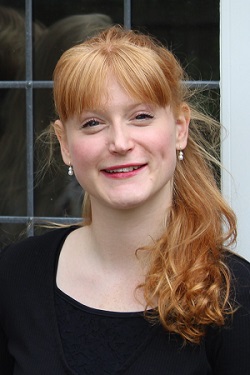Dr Hannah Bower, Churchill
hb391@cam.ac.uk

Biographical Information
I am a Faculty Teaching Associate and College Lecturer at Churchill College. I am a medievalist - with lots of interests in the early modern period too! - and I am particularly interested in relationships between literature, bodies, and emotions.
My PhD was funded by the Wellcome Trust and completed at the University of Oxford; it explored the linguistic and imaginative connections between medieval medical recipes and more canonical literary writings. The monograph based on this research was published (open access) with Oxford University Press and shortlisted for the 2022 British Society for Literature and Science Book Prize. Through the Wellcome Trust, I also completed a six-month secondment fellowship at the London Science Museum during which I explored the editorial history and reader reception of eighteenth-century medical pamphlets.
My current research projects continue this interdisciplinary approach. I have produced a series of articles investigating how human-engineered spectacles—performed by bodies and formed (or re-formed) in text—might function as fecund sites within medieval writings for intersections between different written and dramatic genres, literary forms and inhabited spaces. This recently led to the organisation of a conference called The Multimedia Craft of Wonder.
At the same time, I am working on a second book project entitled 'Representing Rupture in Domestic Literature, 1300–1550'. It explores physical acts of tearing, cutting, and fragmenting in different kinds of writing connected to medieval and early modern households, tracking the way that this recurring imagery changed across versions of works. I explore how this imagery is used to ask fundamental questions about the relationship between family and fragmentation. My research so far suggests that, rather than simply being sensational or conventional, such imagery was a lively cognitive tool in many different genres for thinking about the precarities and strengths of domestic relationships, as well as a means of expressing what domestic connection and disconnection felt like.
Research Interests
Medieval medicine and science; emotions; embodiment; wonder; imagination; genre and form
Areas of Graduate Supervision
I welcome enquiries related to any of the following in medieval writings: emotions, bodies, medicine, domesticity, gender, instructional writings.
Selected Publications
Books
- Hannah Bower, Middle English Medical Recipes and Literary Play, 1375–1500 (Oxford: Oxford University Press, 2022)
Book Chapters and Articles
- Hannah Bower, ‘Science’, in the Routledge Global Chaucer Companion, ed. by Craig Bertolet and Susan Nakley (forthcoming in 2024 with Routledge)
- Hannah Bower, ‘Charms, Remedies, and Recipes’, in The Oxford Handbook of Middle English Prose, by Emily Steiner and Sebastian Sobecki (forthcoming in 2024 with OUP)
- Hannah Bower, ‘“An Experiment to make a flodde of water to com into a howse”: Rethinking the Relationship between Narrative and Performance in Medieval Wonder Recipes’, Studies in the Age of Chaucer (forthcoming in 2024)
- Hannah Bower, 'The Brickmaker, the Tavernkeeper, and the Knight: The Role of Obscurity and Imagination in Medieval Medical Recipes', in Recipes and Book Culture in England, 1350–1600, ed. by Carrie Griffin and Hannah Ryley (forthcoming in June 2024 with Liverpool University Press)
- Hannah Bower, ‘“All toragged and torent”: Fragmentation, Unity and Spectacle in Jack and His Stepdame’, Medium Ævum (2023), 121–54
- Hannah Bower, ‘Bevis of Hampton’, in Women in the History of Science: A Liberating the Curriculum Sourcebook, ed. by Rebecca Martin and others (London: UCL Press, 2023)
- Hannah Bower, ‘“Her ovn self seid me”: The Function of Anecdote in Henry Daniel’s Liber Uricrisiarum’, in Henry Daniel and the Rise of Middle English Medical Writing, ed. by Sarah Star (Toronto: University of Toronto Press, 2022), pp. 133–57
- Hannah Bower, ‘Restless Rewritings: The Politics of Enigma and Exposure in The Squire’s Tale’, The Chaucer Review, 57 (2022), 32–67
- Hannah Bower, 'An Overlooked Eighteenth-Century Scrofula Pamphlet: Changing Forms and Changing Readers, 1760–1824', Science Museum Group Journal, 12 (2019), no pagination
- Hannah Bower, ‘Similes We Cure By: The Poetics of Late Medieval Medical Texts’, New Medieval Literatures, 18 (2018), 183–210

